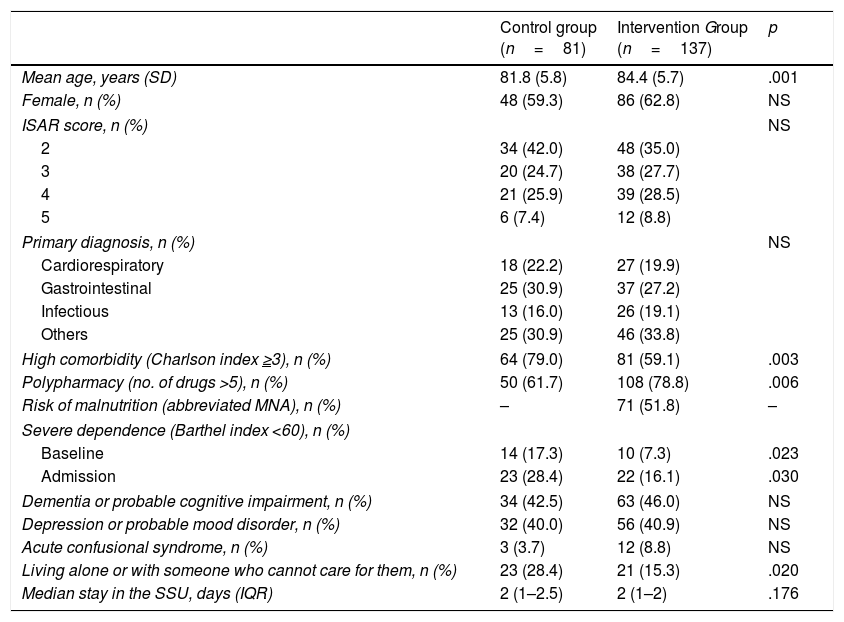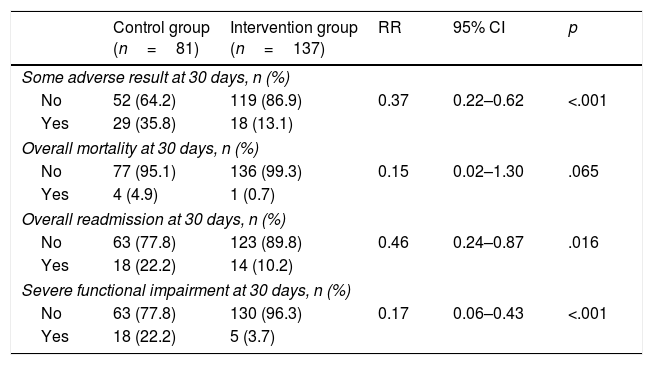To study the effect of a multidimensional intervention on the prognosis at 30 days for frail elderly patients discharged from a short-stay unit.
Material and methodA quasiexperimental study was conducted with a historical control cohort. We included frail patients (Identification of Seniors at Risk score ≥2) 75 years of age or older, discharged from a short-stay unit over 2 months in 2013 (control group) and in 2016 (intervention group). An intervention was conducted based on the activation of resources, based on the deficiencies detected after an abbreviated geriatric assessment, in conjunction with Primary Care. The main endpoint was the presence of an adverse result (death or readmission for any cause or severe functional impairment) at 30 days of discharge.
ResultsWe included 137 (62.8%) patients in the intervention group and 81 (37.2%) in the control group. Eighteen (13.1%) patients in the intervention group and 29 (35.8%) in the control group presented an adverse event at 30 days. A multivariate analysis showed that the implementation of a multidimensional intervention was a protective factor for presenting an adverse event at 30 days of discharge (adjusted RR 0.40; 95% CI 0.23–0.68; p=.001).
ConclusionsThe implementation of an individual care plan for frail elderly patients, based on the activation of resources according to the deficiencies detected after an abbreviated geriatric assessment and in conjunction with Primary Care, could improve the results at 30 days of discharge from an short-stay unit.
Estudiar el efecto de una intervención multidimensional en el pronóstico a 30 días en los ancianos frágiles dados de alta desde una unidad de corta estancia.
Material y métodoEstudio cuasiexperimental con una cohorte de control histórica. Se incluyeron pacientes frágiles (Identification of Senior at Risk≥2), de≥75 años, dados de alta desde la unidad de corta estancia durante 2 meses en 2013 (grupo control) y un año (2016; grupo de intervención). Se realizó una intervención basada en la activación de recursos, en función de los déficits detectados tras una valoración geriátrica abreviada, más la coordinación con Atención Primaria. La variable de resultado principal fue la presencia de algún resultado adverso (muerte o reingreso por cualquier causa o deterioro funcional grave) a los 30 días del alta.
ResultadosSe incluyeron 137 (62,8%) pacientes en el grupo de intervención y 81 (37,2%) en el control. Dieciocho (13,1%) pacientes en el grupo de intervención y 29 (35,8%) en el control presentaron algún evento adverso a los 30 días. Tras un análisis multivariable, se demostró que la realización de una intervención multidimensional fue un factor de protección para la presentación de algún evento adverso a los 30 días tras el alta (RR ajustado 0,40; IC 95% 0,23-0,68; p=0,001).
ConclusionesLa realización de un plan de atención individualizado, basado en la activación de recursos, en función de los déficits detectados tras una valoración geriátrica abreviada, y la coordinación con Atención Primaria, entre los pacientes ancianos frágiles podría mejorar los resultados a los 30 días tras el alta desde una UCE.
Article
Diríjase desde aquí a la web de la >>>FESEMI<<< e inicie sesión mediante el formulario que se encuentra en la barra superior, pulsando sobre el candado.

Una vez autentificado, en la misma web de FESEMI, en el menú superior, elija la opción deseada.

>>>FESEMI<<<









